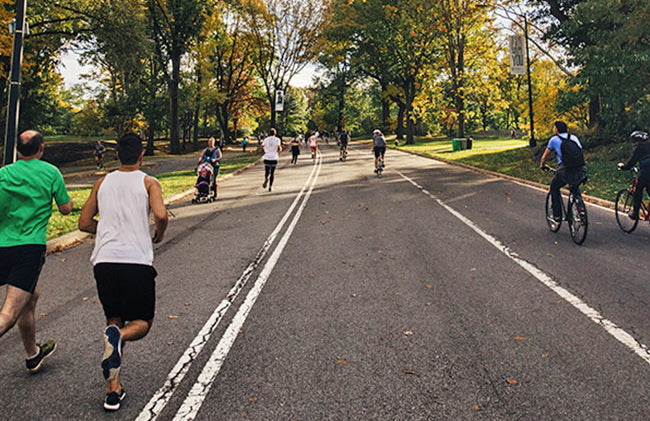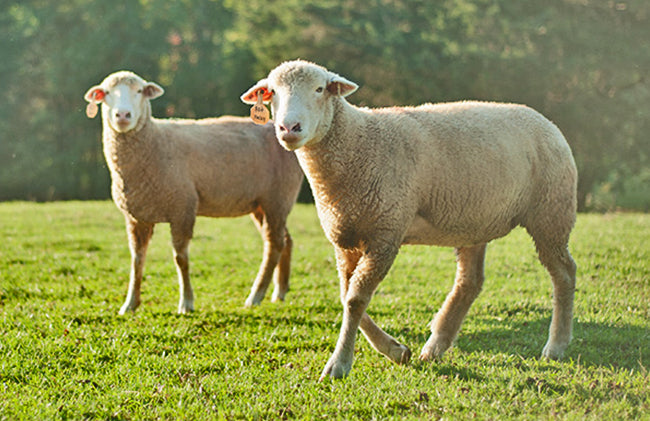Why Eat Lamb
We raise our pastured lamb here on our family farm in Bedford County, Virginia. Pastured lamb meat is nutrient rich, full of flavor, good for you - and ours is locally raised! Check out these top reasons why you should be eating pastured lamb meats.

1.) The Right Meat For Your Healthy Life
Lamb, like other meats in the American diet, is a prime source of protein – delivering all eight essential amino acids in proper portion. Lamb is hormone free and packs a punch of vitamins and minerals. Who needs multivitamins when you can eat lamb? Lamb is a great addition to your healthy lifestyle.
A 3 ounce serving of Lamb Meat provides these daily recommended values:
-
47% of Protein
Research suggests that eating protein can help preserve lean body mass when you’re trying to lose weight. An average 3-ounce serving of lamb, which has 175 calories and meets nearly half of your daily protein needs, encourages feelings of fullness that may prevent overeating, a combination key to weight management.
-
5x Omega-3 Fatty Acids
A 3-ounce serving of lamb provides nearly five times the essential omega-3 fatty acids and alpha linoleic acid of a 3-ounce serving of beef. Three ounces of lamb fits easily within the daily fat, saturated fat and cholesterol recommendations of the Dietary Guidelines for Americans.
-
38% of Selenium
An antioxidant micronutrient that is vital for healthy cell division and cancer protection, thyroid health and detoxification.
27% of Niacin
This is a B vitamin that promotes healthy skin, nerves and aids in digestion. -
37% of Vitamin B12
Only found naturally in animal foods, B12 is important for normal functionaing of body cells and the nervous system.
-
30% of Zinc
A mineral with an important role in immune function, as well as the synthesis of proteins and DNA in the body.
-
10% of Iron
A mineral that is necessary to make hemoglobin and myoglobin, the proteins in red blood cells and muscles that help transport and store oxygen.

Heart Healthy
40% of the fat in lean cuts of lamb is heart-healthy monounsaturated, the same kind of fat found in olive oil.

2.) The Right Meat For the Future
Lamb is grassfed and humanely raised on open pasture without growth hormones. Because our lamb is pasture-based and is allowed to grow naturally to maturity it is a healthier option not just for your body but for the earth and for future generations. Our lamb’s eco-friendly origins make it a top choice from farm to table. In partnership with O2 Energy, we also combine local food production with renewable energy production. Here are some basics about Blue Ridge Lamb and Wool lamb:
Why Our Lamb Is Different
-
Environmentally Friendly
The Blue Ridge Lamb & Wool farm is enrolled in several conservation
practices that protect our waterways, improve soil quality, and reduces
environmental impact. -
Pasture Raised
Our lamb is pasture raised on grass in fresh air and sunshine. We treat our animals with the utmost respect. Humane animal treatment and care is our top priority.
-
Renewable Energy
Our sheep are also groundskeepers for the town of Bedford, Virginia's solar farm. We graze portions of our flocks under solar panels this year.

3.) The Right Meat For Flavor
Lamb is easy to prepare and can be fun to cook! When cooked properly, lamb is flavorful and juicy, and the methods for preparing it are no different than those you use for beef and pork. Lamb is great for braising (slow cooking with moist heat), roasting (cooking with dry heat) and grilling. Here are some lamb meat basics to remember:
Lamb Meat Basics
-
Versatile For Many Dishes
Lamb is versatile for many kinds of dishes and perfect for breaking up the monotony of the weekly family meal. Lamb is also great for a romantic or celebratory meal! It pairs well with various wines and beers.
-
Keep It Fresh
Store fresh lamb in the refrigerator or freezer after purchasing. Fresh lamb should be refrigerated at or below 40 degrees. Ground lamb and stew meat should be used within 2 days. Use chops and roasts in 3 to 5 days.
-
Saving It Longer
If you plan to freeze your lamb for a longer period of time, wrap it in its original packaging with airtight freezer wrap, or place it in an airtight freezer bag to prevent freezer burn. For the best flavor, use frozen lamb in 3 to 4 months.
